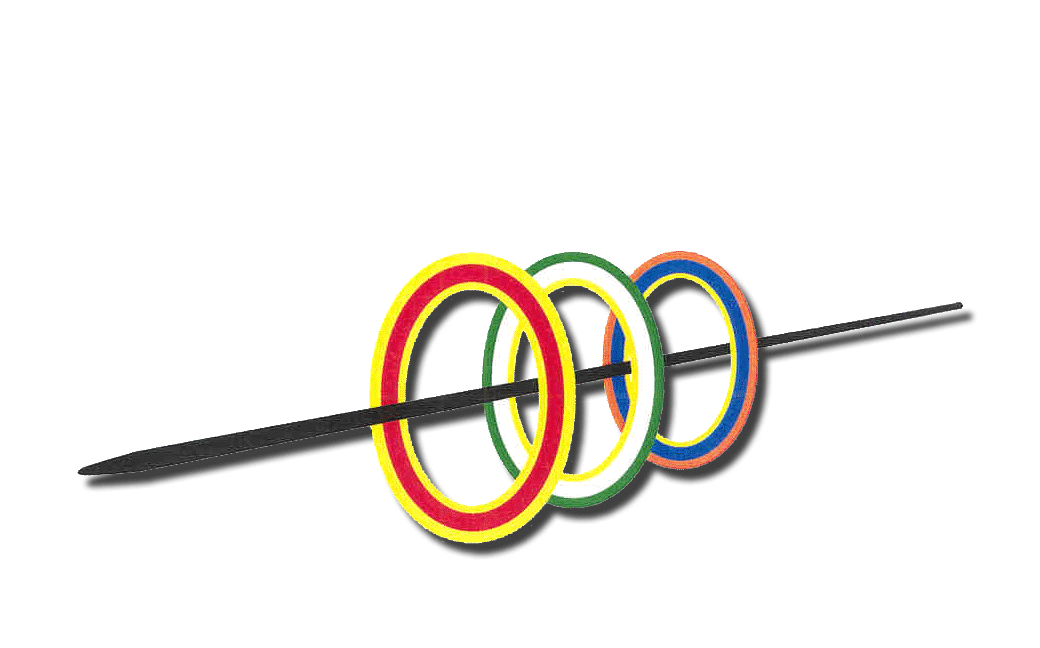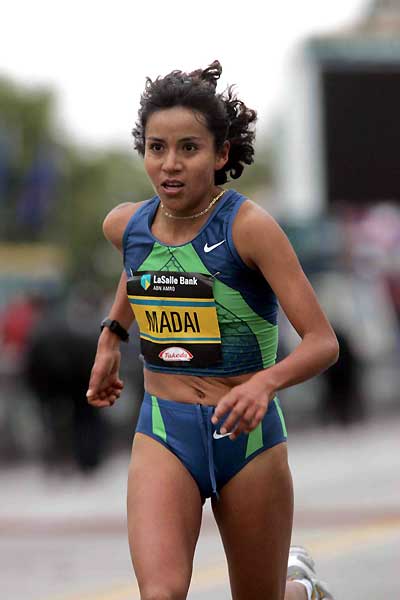 |
AthleCAC.org |
CENTRAL AMERICAN & CARIBBEAN ATHLETICS CONFEDERATION online |
| Madaí Perez’s 2:22:59 reward |
| 2 Dec 2006 - Javier Clavelo Róbinson CUB (jclavelo75@yahoo.com) |
| Source: IAAF (View article) |
 Ciudad de México MEX - Madaí Perez Carrillo does not hide the love for running that led her to a Mexican record of 2:22:59 when finishing fourth at the La Salle Chicago Marathon on 22 October this year. By becoming the first Spanish speaking woman to break the 2:23-hour barrier, the tiny 1.57m tall athlete has put her country back in the elite of world distance running, nearly a decade after a golden 1990-1999 period. “I was so focused on the race that I did not realize the time. When I saw the clock, it read 2:22:30 with a few metres to go. I kept pushing and was able to dip under 2:23,” commented Pérez. Perez exploded with joy just as she used to do after taking running success during her school days, and she celebrated with her coach Germán Silva and husband and elite runner Odilón Cuahutle, who had clocked 2:18:43 in Chicago. In the beginning... Born in the central Mexican state of Tlaxcala, on 2 February 1980, the third of five siblings (two girls and three boys) Perez was always active. With no sporting background in her family, the tiny Perez was continuously asking her physical education teacher to let her run and play sports. “It was not easy at the beginning. My parents did not conceive the idea of doing sports, but I loved to run and break the pre-established rules,” she recalled. Arturo Román Sánchez guided her first steps in the sport when she was 10 and realized her potential for distance running. After some success on the Mexican scene, Perez first enjoyed the taste of international victory when first over 5000m at the 1998 Central American and Caribbean Junior Championships in Georgetown, Cayman Islands. A year later, she smashed the 5000m national junior record with a 16:08.99 minute running on high altitude (1500m above sea level) in Xalapa, before clinching two medals (5000m gold and 3000m silver) at the 1999 Pan American Junior Championships in Tampa. On the road, she impressed with a fast 1:12:27 half marathon at Monterrey. In her first year as a senior, she claimed the half marathon title at the inaugural NACAC under-23 Championships in Monterrey, a title she repeated two years later in San Antonio, Texas. During those years, her former coach instructed her to run many road races. Things changed in 2002, when she started to train under the guidance of two-time New York marathon winner German Silva, and in 2003, Pérez claimed her first national senior crown and improved her 10,000m and half marathon bests to 32:50.89 and 1:11:50. Missed out on the Athens Olympics Her official marathon debut came in Chicago in 2003, after dropping out of the Los Angeles race earlier that year after the 30km mark. She posted the fastest time for a Mexican woman in her marathon debut: 2:31:34 for 12th place. Also in 2003, suffering from the heat she finished fifth over 10,000m at the 2003 Pan American Games in Santo Domingo. In 2004, she made tremendous progress when second in Rotterdam with 2:27:08, to move up to second on the all-time Mexican lists. However, the Mexican Athletics Federation had closed the Olympic qualifying process a month earlier and her time in Rotterdam was not considered for Athens. She tried a second marathon in New York and hit the first half in 1:10:55, before fading to ninth (2:29:57). In 2005, it was another year of progress as she ran 9:17.63 over 3000m, a half marathon in 1:10:35 and a brave race for 11th (2:26:50) at the 2005 World Championships Marathon in Helsinki. She was also sixth at the World Half Marathon Championships in Edmonton (1:10:37), just 17 seconds from the bronze medallist. Track preparations She began her campaign this year with a third consecutive win at the Guadalajara Half Marathon (1:12:30), but failed to finish the Los Angeles marathon in March, visibly weakened by an infection. She stayed loyal to her plan and said she would not try another marathon until Chicago in October. In between, she improved her times on the track (15:57.86 at 5000m and 32:22.09 at 10,000m) and grabbed the bronze medal over the former distance at the 20th Central American and Caribbean Games in Cartagena. A high-altitude half marathon win (1:13:32) in Atlas-Colomos was the final test before returning to the 'Windy City', where she had made her marathon debut in 2003. In cold conditions (4 C.) in Chicago, she ran her 15km (50:00) and half marathon (1:10:15) bests and ran stride by stride with eventual winner Berhane Adere of Ethiopia until the 30km mark. Perez kept a consistent pace to smash Adriana Fernandez´ seven-year-old national marathon of 2:24:06. Another Mexican, two-time Olympian Dulce Maria Rodriguez, also improved her best to 2:28:54 to finish 10th. The top four women bettered their national records. “I wanted to go back to Chicago. In 2003, although I ran 2:31, it was a tough race as I did not train with the necessary volume, ” recalled Perez. “I was running with (Australia’s) Benita Johnson, but I did not find my feed bottle and had to stop to look for it around the 35km mark. I lost some 7-8 metres and could not catch her again.” “When I crossed the finish line in 2:22:59, I did not believe I had run that fast. Once home, I assimilated what it meant to run this time.” That clocking puts her 29th on the all-time lists. A family business Pérez and Cuahutle complement each other. Married six years ago and the parents of 5-year-old Kenjiro, they usually go for long runs together, accompanied by five recreational runners in Tlaxcala. Her daily sessions go 8.00-10.30am and 5.00-6.30pm. “He (Cuahutle) fully understands what a hard training session is. We share the same passion. But I also owe a lot to my sister in law Martha. She takes care of the child and the house work. When we return, it is all ready”. "German Silva has taught me to think big and not pursue money in races every weekend." Off the track, she prefers to spend time with her family. “I have been involved in athletics since I was a girl so I have not really had the time to do other things.” Praise for Perez “This girl has always had great level and this time will boost her confidence among the world’s best. She is an example of what Mexicans can achieve if they would not run so often for money”, commented 1990 Chicago marathon winner Martin Pitayo. “She is a very dedicated athlete and her coach has taken her to the world class level. I wish men could react the same way and recover Mexico’s reputation in the marathon world.” According to statistician Luis Pineda, “she has sacrificed money for a great result and she has succeeded. I have known her since she was 9 and it is no surprise for me. She can go even farther.” Track times, Río and Osaka Already qualified for the 2007 World Championships, “we have sufficient time to prepare for Osaka, but our long term goal is the Olympic Games in Beijing,” confirms Perez. After a well-deserved active rest, Madaí will also focus on the track, with the aim of representing Mexico at the Pan American Games in Rio de Janeiro. “Track and road should go hand in hand. It is important to improve my times, which are a good complement for the marathon.” Her racing calendar is finalised yet, but it will certainly include some track races in Mexico and North America. The national and CAC half marathon record (1:08:34), set by Olga Apell in 1993, is also within her reach. With such busy career, she hopes to find the time to finish the last semester to get her B.A. degree in Physical Education. Her time in Chicago has provided some light for Mexico’s distance running after some years of low par results. Mexico posed a serious challenge to Africa in the golden 90´s, when Silva won the New York twice, Dionicio Cerón triumphed in London three times, and Andres Espinosa lowered the national marathon record to 2:07:19. Other feats included Martin Pitayo’s win in Chicago in 1990 and Adriana Fernandez´ victory in New York ´99 and second place in London also that year. “If they made it and I did, others can get there (world class) too, but they need the support from the base. When you are a champion, everyone wants to help, but it is difficult to find that help before. We need to encourage the future. There are a lot talented guys.” Javier Clavelo for the IAAF in cooperation with Luis Pineda and Gustavo Borges Marathon progression 2003- 2:31:24 2004- 2:27:08 2005- 2:26:50 2006- 2:22:59 Half Marathon 1998-1:17:17 1999-1:12:27 2002-1:15:52 2003-1:11:51 2004-1:10:55& 2005-1:10:36 2006-1:10:16& &- en route to a longer distance |